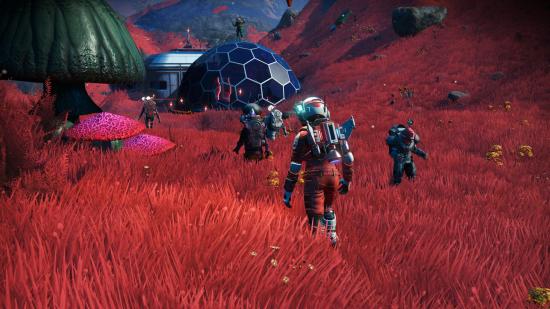In a talk at this year’s Develop: Brighton conference Iain Brown, senior programmer at No Man’s Sky developer Hello Games, has given some insight into how Microsoft’s Azure cloud computing tech has helped players share the game’s procedurally generated universe. And, it turns out it’s come in handy in helping to bring one of this year’s biggest new features to life – and then keep them a surprise.
In a case study talk with Harvey Eagle, director of Azure gaming at Microsoft at the conference, Brown explains how the service’s cloud-based tech has helped keep players interested. It seems No Man’s Sky’s Expeditions, the shared, seasonal exploratory mode rolled into the space game earlier this year, are a great example. For context, these are time-limited events that arrive in-game on a regular basis, though each is “unique” in terms of its exact duration and the milestones (open-ended challenges) players will have to hit to complete it. So, naturally, these Expeditions are something Hello Games would want to keep a surprise until they’re rolled out and ready for players to discover.
“We don’t want people hacking the game client to unlock this mode early or seeing what’s coming, or whatever, so all that data lives in the cloud,” Brown explains, referring to the Expeditions. “It lives in table storage within Azure and then, at a given time, it will be downloaded to all the clients as they need it.”
Brown goes on to explain how this also helps the relatively compact team at Hello Games create and support this feature for players without needing too many devs on-hand to tackle the process of getting Expeditions live. “This is all now set up by the designers. We’ve tried to remove as much as possible from needing a coder to do this – it’s just a designer who will set ‘this is a time the season starts’, ‘this is when it finishes’, ‘this is the file that describes what it does’, ‘here [are] the rewards’, all that kind of thing.

“It’s very much about empowering – it’s on us to do this so that we don’t need a coder, because we don’t have that many coders. We’re all about trying to reduce the dependence on coders.”
Similarly, Brown talks about how the studio has leveraged the Azure cloud tech for No Man’s Sky’s weekend missions – community-driven events which are currently into their third series, and which players complete collaboratively. “They’ll do a task together which has a target for everyone to do,” he explains. “It will allow each player to do a little bit of contribution each day; we don’t want to let one player come in and just do millions of whatever the thing is – so there’s a limit per player, per day. But we want people to come back.

“All that is done in Cosmos,” Brown explains – this being a “fast NoSQL database with open APIs for any scale”, as its site describes. “We’ve got scripts that allow people to submit the fact that they’ve done this thing and it adds them all together,” providing a dataset that can be used to work out how many of these ‘things’ have happened since the mission launched. All of this means that the data-driven process can just happen without the need for coders to run things from Hello’s side. “There is no coder involved in doing any weekend missions; it’s all just set up and runs, and it just automatically deploys itself,” Brown says.
If you’re a fan of the game’s seasonal community content, check out what’s coming for the spooky season with No Man’s Sky’s Halloween-themed expedition, Emergence, at that link.
